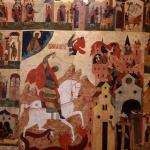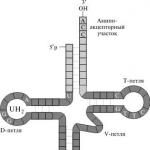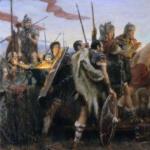Questions to the legend about the feat of Mucius. Scaevola, honorary name of the hero of the war with the Etruscans Gaius Mucius
He retired to Lars Porsena, king of the Etruscan city of Clusium, and asked for his help. Porsena marched on Rome with such a large army that the Romans could not go into the field to fight him, and he occupied the Janiculum, a hill on the right bank of the Tiber. The Roman detachment, stationed in a fortification on this hill, fled into the city across the bridge; the enemies were chasing him and would have entered the city along with the fleeing people if Horace Cocles, who was entrusted with guarding the bridge, had not stopped them. He was a strong warrior and with two comrades repelled the enemies rushing to the bridge, and behind him, on his orders, they broke the bridge. When it was barely possible to pass, he sent away his comrades and alone continued to defend access to the bridge, until he learned from the crack of the fallen deck and the joyful cry of the soldiers who had broken the bridge that the work was over. Then he called on Father Tiberin (god of the Tiber River) to take him and his weapon into his sacred water and protect him; Having prayed, he jumped into the waves and swam to the Roman shore under the arrows of enemies. Later, when hunger began to rage in the city, each citizen, in gratitude, gave Horace part of the food that he himself so badly needed; and the Republic, at the end of the war, erected a statue of him and gave him as much land as he could plow with a plow in one day.
Mucius Scaevola
Mucius Scaevola received the same award. A severe famine began in besieged Rome; Rome could not resist for long; Mucius Scaevola, with the permission of the Senate, went to kill the Etruscan king in order to save his homeland. He secretly entered the camp and, knowing Etruscan, entered the royal tent, but by mistake stabbed to death a richly dressed dignitary instead of the king. Porsena wanted to find out if he had any accomplices and, in order to force him to confess, threatened him with torture; he placed his right hand on the fire of the altar to prove that he was not afraid of torture or death. Having lost his right hand from fire, he received the nickname Scaevola (left-handed) for this feat. Surprised by such heroism, Porsena let Mucius go unpunished, and as if in gratitude for this, he advised the king to hasten the conclusion of peace, telling him that three hundred noble young men had sworn to save their homeland from the Etruscan king and that he, Mucius, was destined by lot to go first. This threat frightened Porsena so much that he made peace. Without demanding the restoration of Tarquin's power, he left the Janiculum, being content with the Romans' promise to return seven districts to the Veii and taking ten young men and ten girls from the Romans as a pledge of fidelity to the terms of peace. When he went back, Clelia, a brave girl, deceived the guard and, together with other hostage girls, swam across the Tiber and returned safely to Rome. At Porsena’s request, the Romans returned Clelia to him, but the magnanimous king honored her courage, returned her freedom, and allowed her to take with her the young men who had been hostages to their homeland. The Republic placed Clelia at the upper end of the sacred path a statue depicting her sitting on a horse. Porsena's son Aruns went with a detachment of troops to the Latin city of Aricia; but other Latins and the tyrant of the city of Cum, Aristodemus, came to the aid of Aricia, defeated Aruns, and he himself was killed in battle. The fleeing Etruscans were hospitably received in Rome. Many of them did not want to return home and settled in that area of the city of Rome, which after that became known as the Etruscan part.
Mucius Scaevola and Porsena. Painting by M. Stoma, 1640s
Around this time, other settlers came to Rome. The Sabine Attus Claus, living in the city of Regilla, was forced by political opponents to leave his homeland and came to Rome with his clients; there were so many of them that the number of armed men extended to 5,000 people. He was given land beyond the Anion River. He took the name Appius Claudius in Rome; the Claudian family descended from him.
Rome's war with the Latins and the Battle of Lake Regilli
Abandoned by Porseno, Tarquinius came to his son-in-law Octavius Mamilius, and Mamilius convinced the Latin alliance to start a war with Rome to restore Tarquinius' power. When the Latins marched on Rome, the Romans appointed a dictator - this was the first time that this dignitary had been appointed. The dictator won a glorious victory over the Latins at Lake Regille, north of the Latin mountains, between Rome and Praeneste. According to the legend about this battle, it was a series of fights similar to the battles of Homeric heroes near Troy. In the front row fought the brave commander Postumius; The old man Tarquin fought with him, but the wounded man had to leave the battlefield. The commander of the Roman cavalry, Titus Ebucius, entered into battle with Octavius Mamilius; they wounded each other, but Ebucius’s wound was severe and he had to leave the battle, and Mamilius, overcoming the pain of the wound, led the Roman exiles, commanded by Titus Tarquinius, into battle. Marcus Valerius, Poplicola's brother, was killed; two nephews wanted to take his body from the enemies, but they themselves were killed; The Romans were overcome by fear, but Postumius came with his cohort and the Romans began to win. Mamilius encouraged his retreating army; Herminius, one of the two warriors who helped Horace Cocles prevent the Etruscans from entering the bridge, killed Mamilius, but while removing his armor, he himself was killed. The Roman horsemen dismounted, went into battle on foot and completed the victory. The enemies fled; The Roman horsemen mounted their horses again, pursued them and took their camp. The dictator returned with a victorious army to Rome and built a temple at the spring of Juturna. Dioscuri, whose help gave the Romans victory.
The defeat of the Latins at Regilla destroyed the last hope of old Tarquin. He went to the tyrant Aristodemus in Cumae and died there. His followers who left with him lived and died in a foreign land.
The legend of the war between Rome and Porsena and historical facts
This is how the legend tells about the wars that resulted from the expulsion of Tarquin. All its details indicate that the history of these years still remains on the shaky ground of folk legend, in which truth and fiction are inextricably intertwined. The heroes participating in the great cause of liberation are semi-mythical images of legend, exceeding the size of reality. They all meet a glorious death in battle. Perhaps the legend is based on historical facts; the expelled dynasty, perhaps, made attempts to regain lost power with the help of foreigners, as the expelled Greek tyrants did; but if this was so, then the history of the founding of the republic still remains shrouded in the fog of fiction, and the closer one looks at this legend, the more doubtful it becomes. The traitor of the warrior with Porsena is especially embellished; the truth in it is entangled in poetic fiction. The Romans wanted to think that their ancestors always acted heroically, always defeated their enemies. But no matter how the legend glorifies the era of the founding of the republic, no matter how it embellishes the war with Porsena, we have news indicating that the Etruscan king took possession of Rome and imposed difficult peace conditions on the vanquished. The Romans had to cede to him part of their land (according to Niebuhr's assumption, ten tribes, i.e., a third of the Roman region); pledged not to have any iron tools, except for agricultural ones; the Senate sent the Etruscan king the emblems of royal power over Rome - a curule chair, a scepter, a golden crown and a toga embroidered with gold; gave him, when he left, hostages of loyalty. It is clear that, having conquered Rome to himself, Porsena did not restore Tarquin’s power over it; he abandoned the patronage of Tarquin all the more easily because he quarreled with him, as some news say; and it may very well be that Porsena’s campaign had nothing to do with the expulsion of Tarquin, that only a later legend connected this Etruscan invasion with the case of Tarquin. In general, the Etruscan war represents a lot of darkness. There is no doubt that if the Romans were really forced to recognize the power of the Etruscan king over themselves, they very soon threw off this yoke; but we don’t know how it happened. Niebuhr believes that the victory at Aricia liberated Rome and Latium from Etruscan rule, which was fleeting. There is an opinion that Porsena's campaign was the result of a reaction of national Etruscan feeling against the Greek element, which gained predominance in the kingdom of the Tarquins; there is another opinion that the Etruscans, pressed by the Gauls, went south to settle in Campania and that Porsena’s campaign was only the movement of settlers from northern Etruria through the Roman region. We do not have sufficient materials to decide which of these opinions is correct. The only certainty is that Rome, under the kings, acquired dominion over part of Etruria and that under the republic this dominion fell. Porsena in legend is the ruler of all Etruria; Perhaps “Porsena” is not a personal name, but an Etruscan name for a king.
So Porsena’s plan to take Rome on the move failed, and he began to besiege it, damming the Tiber in some places and placing guards in others. For the first time in its history, Rome found itself in the position of those cities that fell victim to it. The threat of famine loomed. It was then that the noble young man Gaius Mutius appeared in the Senate and addressed the senators with the following words:
Father-senators, I decided to swim across the Tiber and, if possible, penetrate into the enemy camp. Not to rob, not to avenge robbery - I decided to do something more, if the gods help.
The senators realized that the brave man intended to kill Porsena, and gave him permission to leave Rome.
Guy Mucius quickly walked towards the hill, surrounded by a palisade and rampart. The Etruscan robe on him had dried overnight, and it is unlikely that the Etruscan guards would have thought that he had swum across the Tiber. But they can simply talk to him, and then he will die without fulfilling what he hinted to the senators. But as a child he spoke Etruscan as easily as in his native language. A thin face framed by graying hair, a hooked nose, and loving eyes surfaced in my memory. Nanny Velia, she was from Tarquinia, replaced his mother. Yes, yes, he called her that way - “ati”, and the nanny, reinterpreting his name in her own way, Kai, but sometimes “clan” - son.
So Guy said out loud two Etruscan words - “spura”, “tiv”, and they dragged others along with them. No, these words are unlikely to be useful. Guy suddenly remembered that the nanny, angry with one of the servants, and they did not like her as a foreigner, said with a hiss: “Tukhulka!” Guy didn't know exactly what that meant, but it was the word he thought he might need.
But it was as if Romulus himself, seeing from heaven in what danger the city he founded was in, came to Gaius’ aid. At the edge of the forest he was called out by a warrior who had shot a boar. He couldn't have carried it himself. Guy's help came in handy. Without asking anything, he did not close his mouth all the way to the gate; of course, he boasted of his luck. Lively speech helped Guy remember a few more Etruscan words: tur - “come on”, “rumah” - Roman. And he was tempted to say “mi rumah” (I am a Roman) and knock down the braggart with a blow of his fist, but he resisted, because he promised to kill not a simple warrior, but King Porsena himself.
Thus, chance helped Mucius enter the camp without hindrance. The guards, seeing that they were dragging a boar, not only did not take an interest in those entering, but even tried to help them. It was so awkward that they splashed Mucius with boar's blood. It was here that the daredevil used one of the Etruscan words.
Tukhulka! - he exclaimed, parting with his companion, he hurried to where the Etruscans were going. And they walked to a tent in the center of the camp, which stood out for its size.
Entering the tent, Mucius squeezed into a crowd of Etruscans who surrounded the platform on which two richly dressed people were sitting. Walking around, he pulled out a sword and struck the one from whose hands the Etruscan warriors received their reward.
Mucius was immediately captured. The body of the murdered man was carried out, and everyone except the king and bodyguards left.
You apparently wanted to kill me, but you killed my treasurer,” Porsena turned to Mucius. - Now you tell me who you are and what you were trying to achieve, or I will call the executioners.
Mucius looked around and saw a brazier with coals prepared for the sacrifice. Without turning around, he put his hand into the fire and fixed his fearless gaze on the king. This lasted until Porsena, recovering from his amazement, shouted to the bodyguards:
Pull him away!
When this was done, the brave man turned to Porsena with these words:
My name is Muciem. I am a Roman and wanted to kill you, because you are our enemy. I didn't succeed. But know that three hundred young men like me are ready to accomplish the same feat.
Give him the sword,” the shocked Porsena ordered the bodyguards.
When Mucius took the sword with his left hand, Porsena said to him:
You can return to your city. Tell those who sent you that Porsena values valor.
And Mucius returned to Rome, where no one expected to meet him. And everyone marveled at the courage of this man and were upset that they could not fulfill their plans. Since then, Mucius began to be called Scaevola (Left-handed). This nickname passed on to his descendants.
Scaevola, lat. (“left-handed”) is the honorary name of Gaius Mucius, hero of the war between the Romans and Porsenna (emphasis on the first syllable – Scaevola).
When the Romans expelled King Tarquin the Proud (see article on) and proclaimed the Republic, the Etruscan king Porsenna marched on Rome with a large army and surrounded the city, demanding the restoration of the power of Tarquin (who was Etruscan by birth). Soon the ruler reigned in the besieged city. Then the Roman youth Gaius Mucius decided to infiltrate the Etruscan camp and kill Porsenna. Having received consent from the Senate, Gaius Mucius disguised himself as an Etruscan, hid a sword under his cloak and went to the enemy camp. That day, no one there thought about vigilance - the soldiers hurried to the royal tent, where they were given their salaries, and Mutius mingled with the crowd. A richly dressed scribe sat next to the king and gave money to the soldiers. Mucius was afraid to ask which of these two was Porsenna, lest he give himself away; Having decided that such huge money should most likely be managed by the king, he drew his sword and killed the scribe. The captured Mucius fearlessly declared to Porsenna’s face: “I wanted to kill the enemy, and now I’m just as ready to die as I was ready to kill you. The Romans know how to act and how to endure. And not only I set the goal of ridding my homeland of the enemy, many dream of such honor and glory. Therefore, prepare yourself, if you want, for this danger - the Roman youth have declared war on you! But do not be afraid of the army, do not be afraid of the battle. You will only ever deal with one person!”

These words, no less courageous than an act that only by chance did not succeed, would already be enough to forever rank Mucius among the ancient Roman heroes. But that was not all. Seized with anger and fear, Porsenna ordered to bring fire and torture Mucius in order to learn from him all the details about the conspiracy against the king. “Don’t bother yourself,” Mucius objected, “now you will see what your threats mean for someone who dedicated his life to his homeland.” With these words, he placed his right hand on the brazier and calmly held it in the fire, as if not feeling the slightest pain. The shocked king rose from his throne and granted Mutius life and freedom. Mucius thanked him: “Because you know the value of courage, I will voluntarily reveal to you a secret: three hundred noble Roman youths have sworn to take your life. By the will of fate, I went to you first. At the appointed time, the rest will come after me, without thinking about their fate, and this will continue until they reach their goal.”

Gaius Mucius Scaevola In the presence of Lars Porsena, oil on canvas. By Matthias Stom, early 1640s, Art Gallery. N.S.W.
Mucius returned to Rome, and grateful fellow citizens gave him the honorary nickname Scaevola, i.e. “Left-handed.” Soon Porsenna's ambassadors came to Rome. The prospect of living in constant fear for his life frightened him so much that he himself offered the Romans terms of an acceptable peace.
The story about Gaius Mucius Scaevola is contained in the works of Roman historians, in particular in the “History of Rome from the Foundation of the City” by Titus Livius, from which we borrowed it. The family, which traced its origins to Scaevola, gave Rome many prominent men, including Publius Mucius Scaevola, the author of eighty books of the Great Chronicles, published around 130 BC. e., and his son Quintus Mucius Scaevola, an outstanding statesman and lawyer of the 2nd - 1st centuries. BC e. - Eighteen books of his work “Civil Law” marked the beginning of the scientific development of civil law.
Perhaps there is some historical core to this story; it is even possible that it is entirely true. However, it dates back to such ancient times, and Roman authors report it with such a degree of freedom (and without indicating the original source) that we can safely include its hero among the characters of legends and legends.

Indoor and garden flowers Scaevola
The siege nevertheless continued, as did the need for grain, which had risen enormously in price, and Porsena was already hoping to take the city by taxation, but at this time the noble young man Gaius Mucius was indignant that the Roman people, during the time of slavery, were under the rule of the kings. , was not besieged in any war and by any enemy, and now, having freed himself, he was locked up by the very Etruscans, whose troops he often defeated. And so, believing that he should avenge this shame with some great and bold undertaking, he first wanted to sneak into the enemy camp at his own risk. However, fearing that he might be captured by the Roman guards as a deserter if he went without the permission of the consuls and without anyone's knowledge (and the current situation of the city would confirm this suspicion), he turned to the Senate. "I want, fathers,- he said, - cross the Tiber and, if possible, get into the enemy camp, not for the purpose of robbery and not to avenge the devastation; if the gods help, then I have more serious matters in mind! Senators approve.
Hiding the sword under his clothes, he sets off. Arriving there, he stopped in the thickest crowd in front of the king's tribunal. By chance, there was a distribution of salaries to the soldiers, and the secretary, sitting with the king, in almost the same clothes, was very busy, and all the soldiers came up to him. Afraid to ask which Porsena, so as not to betray himself by realizing that he did not know the king, and blindly following the guidance of fate, he killed the secretary instead of the king. Making his way from there through the frightened crowd to where the bloody sword opened the way for him, he was captured by the royal bodyguards, who ran to the cry. Standing before the king's tribunal and at such a terrible moment, instilling fear in others more than fearing himself, he said: “I am a Roman citizen; my name is Gaius Mucius; as an enemy, I wanted to kill the enemy, and I was just as ready to die as I was ready to commit murder. The Romans know how to act bravely and endure. And I am not the only one who has planned this against you: a long line of those seeking the same honor follows me. So, if you wish, then get ready to risk your head every hour and see the enemy’s sword on the threshold of your palace - we, Roman youths, declare such a war on you; do not be afraid of the army, do not be afraid of the battle; You alone will have to deal with individuals!”
When the king, inflamed with anger and frightened by the danger, gave the order to light fires all around, threatening him if he did not immediately reveal what ambushes he had told him about mysteriously, he replied: “Here it is for you to understand how little the body is valued by those who foresee great glory!” At these words, he placed his right hand on the fire lit for the sacrifice. When he burned it, as if feeling nothing, the king, beside himself with surprise, jumped up from his seat, ordered the young man to be pulled away from the altar and said: “Go away, you who dared to commit a more hostile act against yourself than against me! I would say: praise be to you, if your valor stood for my fatherland; “Now I release you from the responsibility to which you were subject by the law of war, and I am releasing you from here unharmed.”. Then Mucius, as if wanting to thank him, said: “Since you honor valor, then receive from me as a gift what you could not achieve with threats: we, three hundred of the best Roman youths, have sworn to fight against you in this way. The first lot fell on me; the rest will appear, each in due time, according to lot, until fate allows you to get hit!”
Gaius Mucius Scaevola In the presence of Lars Porsena. Matthias Stom, 1640s, Art Gallery. N.S.W.
After the departure of Mucius, who then received the nickname Scaevola for the loss of his right hand, ambassadors from Porsena came to Rome: the first danger, from which only the mistake of the murderer saved him, and the prospect of being exposed to it as many times as there were conspirators left, made such an impression on the king that he he himself offered the Romans peace terms. In vain there was talk of the return of the Tarquins to the kingdom; however, this was done rather because he could not refuse the Tarquinii’s request than because he did not foresee a refusal on the part of the Romans. But he achieved the return of the lands to the Veientes, and the Romans were forced to give hostages if they wanted the garrison to be withdrawn from the Janiculum Hill. After peace was concluded on these terms, Porsena withdrew his army from the Janiculum Hill and withdrew from Roman borders. The senators gave Gaius Mucius a field beyond the Tiber for his valor, which was later called Mucius Meadows.
Such honor given to valor prompted women to serve the state: the maiden Clelia, one of the hostages, taking advantage of the fact that the Etruscan camp was located near the bank of the Tiber, deceived the guards, leading a detachment of maidens, swam across the Tiber under enemy arrows and returned them all in good health to relatives in Rome. When this was announced to the king, he first of all, under the influence of irritation, sent ambassadors to Rome to demand the surrender of the hostage Clelia; he doesn't chase after the others. Then, changing his anger to surprise, he began to say that this matter exceeded the exploits of the Kokles and Mutsievs, and declared that if the hostage was not handed over, he would consider the agreement violated, but if she was handed over, he would let her go home unharmed. Both sides kept their word: the Romans returned the pledge of peace according to the agreement, and the Etruscan king not only did not punish, but also honored the valor and, praising the girl, said that he was giving her part of the hostages; let her choose whoever she wants. They say that when they were all taken out, she chose minors, which did honor to her chastity, and the hostages themselves unanimously approved that people of the age at which it is easiest to offend were freed from the hands of the enemy. Upon the restoration of peace, the Romans gave unprecedented honor to the woman’s unprecedented valor by assigning her an equestrian statue: at the end of the Sacred Street, an image of a maiden sitting on a horse was placed.
(Titus Livy, II, 12-13)





